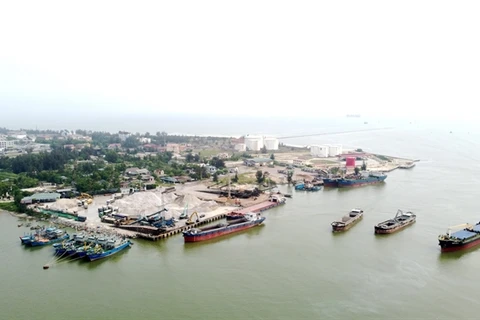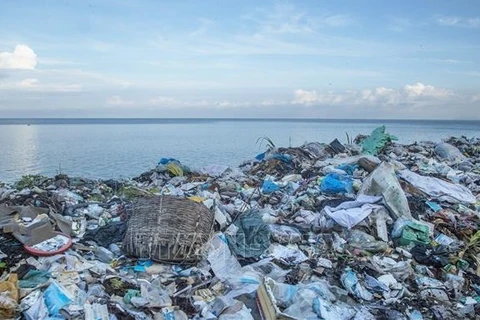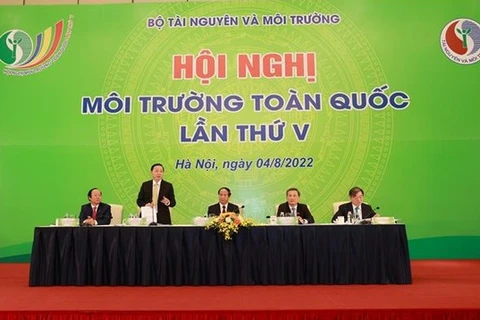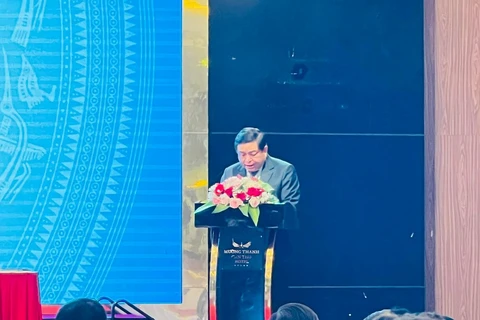 Prime Minister Pham Minh Chinh presents Labour Order, first class to the Ministry of Natural Resources and Environment (Photo: VNA)
Prime Minister Pham Minh Chinh presents Labour Order, first class to the Ministry of Natural Resources and Environment (Photo: VNA) Hanoi (VNA) - The Ministry of Natural Resources and Environment (MoNRE) has consulted the Party and State on numerous policies on the environment, especially as Vietnam has taken the initiative to engage in the Paris Agreement at the UN Climate Change Conference (COP21).
The ministry held a ceremony on August 5 to commemorate its 20th founding anniversary on the same day and welcome the Labour Order, first class.
Speaking at the event, Minister of Natural Resources and Environment Tran Hong Ha affirmed that after 20 years, Vietnam’s first multisectoral ministry has worked various miracles and strengthened its major vanguard position among Government agencies.
Established nearly at the same time as the World Summit on Sustainable Development (Earth Summit) 2002, the MoNRE has worked to keep watch on valuable natural resources and habitats of many species, serving sustainable development goals.
Along with development, the ministry is paying due regard to environmental protection policies in line with socio-economic growth. It has integrated the issue in development strategies, plans and projects.
Accordingly, due attention has been paid to the sustainable development model which acts as a foundation for the country’s growth path in the coming time.
 Prime Minister Pham Minh Chinh and delegates tour an exhibition at the ceremony (Photo: VietnamPlus)
Prime Minister Pham Minh Chinh and delegates tour an exhibition at the ceremony (Photo: VietnamPlus) Vietnam faced numerous difficulties brought by the global financial crisis and economic recess. The ministry gradually carried out its policy of bolstering economic development to tap available resources that support the country’s socio-economic development.
Also in the period, Vietnam for the first time has introduced the Law on Biodiversity and a national target programme on responding to climate change. These topics were gleaned from international experience that meets requirements for sustainable development, and makes use of the ecosystems in climate change adaptation.
As the world enters a period of strengthening response to climate change, which is humanity's biggest challenge in the 21st century, efforts to promote the blue economy and restore natural ecosystems have been intensified. Vietnam has also accelerated the switch from "brown" to "green" growth models, opting for renewable resources generating low emissions, as well as bolstering the sustainable development of the marine economy.
It is worth noting that Vietnam has taken the initiative of joining the Paris Agreement on climate change at COP21 and commits to net zero emissions by 2050.
These are key points of international integration in the environment sector, helping Vietnam access green technologies and finance, restructure the economy and at the same time take the initiative in climate change adaptation and ecosystem recovery work, and more.
At the event, Prime Minister Pham Minh Chinh, on behalf of the Government, presented the Labour Order, first class to the ministry for its major contributions throughout the past two decades. The title was also bestowed to Minister Ha.
Vice State President Vo Thi Anh Xuan presented awards to outstanding collectives and individuals of the ministry.
Also at the ceremony, the Government leader and representatives of the MoNRE and other ministries and sectors joined an activity to kick off the commencement of development goals of the natural resources and environment sector by 2030, with a view to 2045.
To cut net emissions to zero, it is necessary to carry out energy transition and boost low-carbon development. To Vietnam, apart from the aim of reducing greenhouse gas emissions, transitioning from fossil fuels to clean and renewable energy is also meant to step up sustainable economic restructuring and take the opportunity to improve the economy’s competitiveness and development.
Vietnam views energy transition as both an opportunity and a challenge. It is also necessary to transition from fossil to clean energy to match the global trend. On the other hand, it is also important to guarantee energy security, change jobs for the affected workers. This is especially so for those in the coal industry. It is also necessary to ensure power prices are affordable for low-income earners, and equip the country’s manpower with necessary skills to operate advanced low-emission technologies./.























